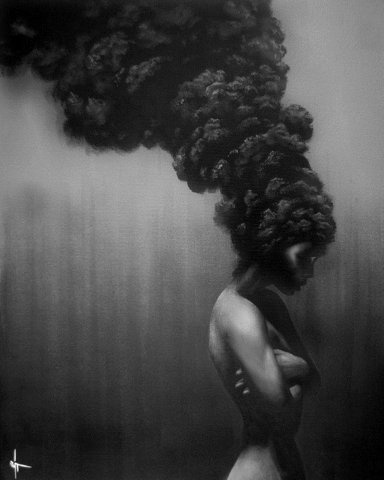“We are not our thoughts; our thoughts are not who we are. Yet we tend to associate ourselves with our thoughts… This is a common error. To equate our thinking with our Being, is to live in a separation.”
~ Eckhart Tolle
“All that we are is the result of what we have thought. The mind is everything. What we think, we become.”
~ Guatama Buddha
As someone who experiences the better part of life as internal monologue, each of these beliefs are liberating and terrifying in their own ways.
The first time I heard Eckhart Tolle’s idea about our thoughts not being who we are was during a guided meditation while studying abroad in Bali.
Initially, I thought, “Thank god.”
Those negative, critical, wildly outlandish words constantly racing through my head did not, in fact, define me as a negative, critical, wildly outlandish human being. Anxious or depressed thoughts were something that I could observe, like clouds passing by overhead, and if I could be aware of them as a separate entity, that meant that the thoughts and myself were not one in the same.
In theory, I liked the idea. In practice, it just didn’t feel true, at least not to me.
Maybe it’s because my entire life up to this point has been shaped around words—more specifically, the words that originate in my mind. I have studied and experimented and succeeded and failed in trying to navigate through the library of thoughts that exists within, and make them accessible to the world without.
Basically, I am in love with expressed thought.
So, what Buddha says feels more authentic—at least on the surface. Every book and experience and emotion and daydream that I have consumed is part of my identity, an additional piece to the ever-growing puzzle that adds up to who we are.
If I think negatively, I feel negative. If think optimistically, I will lead a life of glass-half-fullness. This seems both true to experience and logical.
But, there are downsides here, too. If we become everything we think, that means that at times we are hypocritical, contradictory, petty, unreasonable, and uncontrollable. It means that we can be conceited, and self-pitying, and needy, and stand-offish.
I’m not entirely sure that I want to become everything that I think. Or, maybe I’m just not willing to be that honest.
Either way, I wonder if a middle ground can be found between these two notions of identity.
The big question that arises from Tolle’s point of view is: If we are not our thoughts, who are we?
His answer is that our true identity is found in our “stillness.” This is the place that is beyond thought, that is—in his mind—absolute awareness and presentness.
His answer is also where I believe there is some space for reconciliation.
I do not dispute that this place within us exists, and whole-heartedly believe it is worth trying to discover. It is a place to find peace, to contemplate and reflect without judgment, and to discover wordless answers to wordless questions.
But, it seems that, if this is what houses our Being, then from that place must come the expression of our Being.
And, the expression of our Being, both internally and externally, comes in the form of thoughts.
So, while we may have enough control over them to put our foot down from time to time and say, “No, you do not get to control me today,” dissociating from them entirely is denying ourselves an honest reflection of our reaction to life at that exact moment.
If we are feeling anything—anxious, critical, hateful, overstimulated—letting those things consume us is not going to help anything. However, they are arising from somewhere within us. They are genuine, they are authentic, and regardless of how long we ultimately allow them to remain, they exist.
Thoughts are the mental (and perhaps physical) embodiment of that stillness. We are a spiritual, biological, mysterious being of oneness, and it is unfair to reject anything about ourselves as other.
Without thoughts, without words, we would lose our ability to reach others, to bond over experiences and find the beauty in differences, to connect to people across cities and countries and oceans. And if we didn’t have any of that, then we would really have to wonder—who are we?
Love elephant and want to go steady?
Sign up for our (curated) daily and weekly newsletters!
Editor: Catherine Monkman
Photo: elephant archives


 Share on bsky
Share on bsky





Read 8 comments and reply